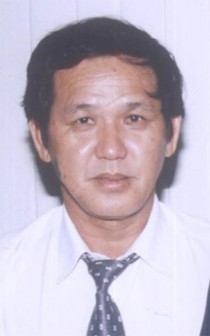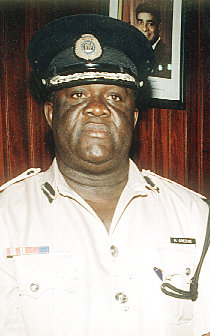Acting Chief Justice Ian Chang yesterday ruled against the advice by the Director of Public Prosecutions (DPP) to charge Police Commissioner Henry Greene with rape, finding that it was irrational as the circumstantial evidence did not present a realistic prospect of a conviction.
By his ruling, Justice Chang made absolute orders granted last month quashing the DPP Shalimar Ali-Hack’s advice to police and prohibiting the institution of a rape charge based on it. Greene’s lawyers sought the orders, saying there was insufficient evidence and that the recommended charge was “irrational,” among other things.

Justice Chang, in a brief comment to Stabroek News after delivering his ruling, said that his decision does not prevent the police from instituting a rape charge against Greene, but they cannot do so based on Ali-Hack’s advice or on the evidence she used to make her recommendation.
Attorney Neil Boston, one of the lawyers representing Greene, told reporters that the judge has found that the DPP’s advice is based on irrationality and if the decision is irrational then obviously “he has the jurisdiction to set it aside.” Boston emphasised that it does not matter how intense the calls from the public are, “a public trial ought not to be undertaken if there is not a realistic prospect of a conviction.”
He said that the evidence that the DPP took into consideration can be deemed inadmissible, while adding that some of it would actually work in favour of Greene. “Since there was an irrational reasoning by the DPP, then the advice to charge cannot stand,” he said.
Boston opined that the DPP clearly had to look beyond the statements that were before her and ascertain if there is a realistic prospect of a conviction. “If the evidence does not establish that there is a realistic prospect of a conviction, then the advice to charge should not be made,” he stressed.
Attorney General Anil Nandlall, in an invited comment last evening, said he had only heard of the judgment and would have to go through the ruling before he could make any comment on the way forward.
Greene, who was not present at yesterday’s hearing, had proceeded on leave to facilitate the investigation into the complaint against him.
Chief Justice Chang, during his two-hour-long ruling, cited many cases to support his decision, including that of former International Monetary Fund (IMF) chief Dominique Strauss-Khan, against whom prosecutors in the US were forced to withdraw a charge of rape because the question of the credibility of the victim came into play.
Inadmissible
Chang found that the 34-year-old mother of two who accused Greene of raping her had no credibility and that her story was highly unbelievable. He quoted every detail of the alleged assault, which made some of the persons in the courtroom, including some women activists, visibly uncomfortable and one of them turned her back on the judge at one point. He also singled out the statements of the alleged victim and those of Carol Innis-Baptiste, who works with Help and Shelter, Dr Dalgleish Joseph and Dr Michaela McRae, on which the DPP based her advice. While the issue of credibility and reliability of the victim came into play, Justice Chang said that the statements by the others were inadmissible in court and the DPP should not have acted on them.
“Her decision was unlawful, and even if not unlawful, was irrational,” Justice Chang said.

The woman had approached Help and Shelter sometime after the alleged incident and later was sent to see Dr Joseph, who later said in his statement that she appeared nervous and was crying throughout the session. He also said he felt her condition necessitated her seeing a colleague with the ability to mange psychological conditions.
“Not only did this observation take place a week after the alleged rape but also it would have been surprising to Dr Joseph to learn that the same nervous and crying [name of the alleged victim] would, one week later (6th December 2011), meet the applicant [Greene] and take his money for windows for her unfinished house-which she had already procured and no longer needed,” Chang said.
The woman had on December 6, 2011 collected $11,000 from Greene and it was that next day she met with Dr McRae on the advice of Dr Joseph and again cried continuously and complained to the doctor that Greene had raped her using force and threats and that she was so traumatised that she could not eat or sleep and was having nightmares. Dr McRae, in her statement, said that she felt the woman was a “patient with severe depression which was incapacitating her since she was spending all day thinking about that incident and was unable to attend to her children or her household chores or to eat or sleep.”
In her statement, Innis-Baptiste said that between October and November, 2011, the woman visited her office and reported the matter and that she returned at the end of November and told her that she would like to be honest and speak the truth. “This implication is that [the alleged victim] was not being honest or frank in her previous report,” Justice Chang noted.
Innis-Baptiste wrote that the woman told her Greene stripped her by tearing her pants in the process and had both oral and vaginal sex with her.
However, Justice Chang pointed out that at no time did the woman mention Greene having oral sex with her.
The Chief Justice said what was told to the three persons by the woman was not legally admissible to support her story as told in her statement to the police. “Clearly, the DPP used evidence (statements) which was legally inadmissible against the applicant in advancing herself as to the sufficiency of evidence and her advice was consequently legally flawed,” the judge said.
He added that it appeared that the decision by the DPP to advise prosecution for rape was based solely on her finding that there was a prima facie case against Greene for the offence. But, he said, in her advice she should have not only looked at whether a prima facie case was made out but “whether there was realistic prospect of a conviction.” He ruled that she should have looked at the matter holistically, giving consideration also to the statements which tended to support the defence of consent.
Consent
In a striking blow to the credibility of the alleged victim, Justice Chang said that the issue of the case was not whether she had consented but rather the “main issue in the case was whether she had not consented, for it was the prosecution which bore the burden of proving non-consent rather than consent.”
He said the fact that the jury would have been the ultimate arbiter of fact did not relieve the DPP of her duty as prosecutorial decision-maker to make a realistic assessment of the credibility and reliability of the statements of the four. “She seemed to have thought that, once she had found that there was prima facie case, she had to advise prosecution irrespective of whether or not the evidence in support thereof was credible and reliable,” he said.
He noted that assuming the DPP had given careful consideration to the contents of the statements, as she claimed, and advised prosecution of Greene, the court still found that “her decision to so advise was irrational in the sense that no prosecutorial authority, having made an objective assessment of the prosecution’s chance of securing a conviction, could have found that those statements gave rise to a realistic prospect of a conviction.”
According to Justice Chang any proper objective assessment of the contents of the statements would lead to the conclusion that, on the issue of non-consent, the prosecution was likely to fail. The court found that the circumstances of the case were very exceptional in that it required an insightful analysis of unusual circumstantial evidence on the part of the DPP, which obviously was not done and, if done, could not have passed the “realistic prospect of conviction test.”
Further, Justice Chang ruled that the case was an appropriate one for a challenge to the decision of the DPP to prosecute. He added that it was also an appropriate occasion to debunk the fallacy that the decision to prosecute rests solely on the answer to the question as to whether there is a prima facie case, and that only a jury must decide the reliability of the contents of statements made to the police in criminal investigations.
“The low rate of prosecutorial success and the heavy backlog of criminal matters pending hearing may well have a functional relationship with this fallacy which seems to permeate the mindset of the prosecutorial authorities in Guyana,” Justice Chang, a former DPP himself said.
He pointed out that the decision to prosecute is of fundamental importance in the criminal justice system-particularly in an accusatorial system which obtains in Guyana. He stated that it is a very important stage in the criminal process, since it involves far-reaching consequences to those affected by it.
“The consequences for a defendant frequently do involve irretrievable loss of reputation or expenditure and even deprivation of pre-trial liberty. The consequences for the victim of a crime where an incorrect decision not to prosecute is made can be equally damaging,” Justice Chang posited. As a result, he said, it behooves the prosecutorial authorities, such as the DPP, to perform their function in such decision-making carefully and consistently with rationality and legality (and with procedural fairness).
The woman had alleged that she was raped by Greene on the night of November 22 last year, after she had sought his assistance to recover her phone, which was seized as part of an ongoing case.
Chang noted that the complainant in attempting to have Greene return her phone, which was part of a criminal investigation, was attempting to pervert the course of justice. He also made mention of the woman reluctantly accepting money from Greene for her children and noted that she had a BlackBerry Curve cell phone but yet had no money to feed her children.
With his ruling, Chang also awarded Greene $50,000 in costs.




